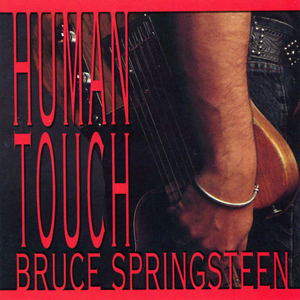*****
Human Touch (1992)
In 1991, Guns N Roses put out the two Use Your Illusion albums simultaneously, an innovation that Springsteen followed the next year with Human Touch and Lucky Town. I am actually surprised more artists haven't followed this early 90s trend, which allows them to craft different vibes on different records in the same creative moment. In Springsteen's case, he had been working on Human Touch for years, and as he went back into the studio to complete it, he had a burst of creativity that became Lucky Town. As you can probably guess by the story of its genesis, Lucky Town is the superior album.
Human Touch gets off to a fantastic start with the title track and lead single. one of the Boss's catchiest. Its longing for love and connection fits with his traditional themes, too. Unfortunately, there is no other track on the record that is close to being this good. I've seen many rate this as his worst album. I can't say that yet for certain, but it is definitely his first average album after a run of excellence. In the context of the time, it didn't help that he had recorded much of it in 1989-1990, at the height of overproduction. He also recorded it with crack studio musicians instead of the E Street Band. 1991 brought multiple major changes in rock music, from REM's embrace of the acoustic, U2 bringing in the Madchester beats and electronics, and most importantly, Nirvana's grunge explosion. This album sounded like a relic the day it was released.
All that being said, if you listened to the album without knowing the artist you would think it was pretty dang good. Despite what a lot of people say online, "57 Channels and Nothing On" was a great little novelty song in the context of the proliferation of cable in the 90s. This is not a bad album, it's just not memorable and not up to the Boss's standards.
Rating: Three Bosses (out of five)
Lucky Town (1992)
While Human Touch feels overly crafted, Lucky Town feels fresh and spontaneous. "Better Days" kicks things off with a bang, and can even be seen as a kind of meta-commentary. After years of studio tinkering on Human Touch, here Springsteen is letting it ride, breaking out of a creative funk. Crucially, studio musicians are less prominent here, helping to de-slickify the sound. It's almost as if Springsteen saw the way music was changing and needed to quickly reorient himself.
Considering its origins, it still feels like a coda to Human Touch, rather than its own creation. That said, it is worth a listen.
Rating: Four Bosses
Greatest Hits
I am not reviewing the entire album, just the new tracks Springsteen recorded. He reunited with the E Street Band, raising hopes that he would return back to his old ways after a disappointing sojourn on his own. This album also included "Streets of Philadelphia," a single from the soundtrack to the film Philadelphia sung from the point of view of a man dying of AIDS. It is one of his most affecting songs, especially considering the stigma at that time around the disease and the lack of life-saving drugs. It gets me every time.
"Murder Incorporated" rocked hard, but was recorded back in 1982. "Secret Garden," "This Hard Land," and "Blood Brothers" were newly recorded but not necessarily newly written. "Secret Garden" was like an outtake from Tunnel of Love, but if Springsteen wasn't sad. "Blood Brothers" and "This Hard Land" were alright but not up to the standards of the rest of the record. "Streets of Philadelphia" is an all-timer, but the rest isn't that memorable.
Rating: Three and a half Bosses
The Ghost of Tom Joad (1995)
I have listened to this album many, many times, more than any other Springsteen record after his "classic" period. It had been awhile since I'd heard it, however, and I was glad to see that it still met or even exceeded my former love for it.
This album came out in late 1995, perhaps the high water mark of the "End of History" feeling after the collapse of communism. The economy was growing again, and very few people wanted to address the ways that America's inequality paradoxically worsened in that period. On my college campus there was no activism, and my leftist political outlook was pretty rare. It was exciting to hear an album like this, where Springsteen returned to the Woody Guthrie mode of Nebraska.
The issues reflected his move to California, with multiple songs about the US-Mexico border, an issue that has come to dominate national discourse. He seems well aware of the times on the title track, which sounds like a lonely cry for justice in a neoliberal wilderness. That song and "Youngstown" are for my money two of the best that he ever wrote. "Youngstown" tells the story of the Rust Belt with such power that it brings a tear to my eye every time.
As with Nebraska, Springsteen has songs from specific points of view like "Straight Time," which goes inside the mind of an ex-prisoner who feels let down by daily life on the outside. It is a quietly profound song that embodies the kind of intrusive thoughts we all carry in our heads.
This album's critical reputation is not as high as my love for it. I see critical comments about the quiet, almost choked way Springsteen sings these songs. It's obviously intentional, and I actually think it works. It's the sound of a man telling truths so against the grain of the time that they are literally hard to hear. Based on his acoustic albums, if Bruce had never fronted the E Street Band he would have ended up being one of this nation's greatest folk singers.




No comments:
Post a Comment